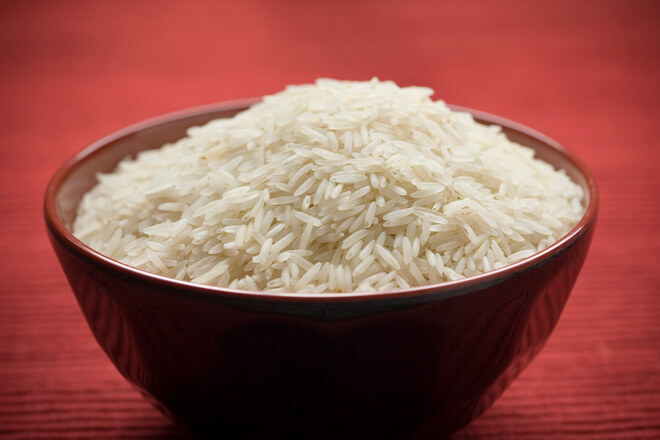History of the Basmati spar:
Basmati has had its share of controversies. It became a controversial commodity after RiceTec, a Texas based company, in 1997, patented certain types of rice which they developed as “American Basmati”. They had been trying to enter the international Basmati market, by way of introduction of brands like ‘Kasmati’ and ‘Texmati’ and claimed to have technologically advanced a new strain of aromatic rice by interbreeding basmati with another variety. They planned to call new variety as Texmati or American Basmati, the same being issued with the patent number 5663484 on Basmati rice lines and grains on September 2, 1997 with the United States Patent and Trademark Office (USPTO). When two Indian nongovernmental organizations – the Centre for Food Safety (CFS), and the Research Foundation for Science, Technology and Ecology (RFSTE), learnt of this they objected to it. CFS is an international NGO that campaigns against bio piracy and RFSTE is an Indian environmental NGO which filed legal petitions in the United States. Additionally, the Centre for Scientific and Industrial Research (CSIR) also objected to it and in turn sought trade protection for Basmati Rice of the Indian subcontinent and the Thailand Jasmine Rice. They specified that the term “basmati” could be used only for rice grown in India and Pakistan, and Jasmine for the Thai Rice. After putting together the evidence, the Indian Government, officially challenged the patent in June 2000 on the evidence that the above mentioned plant varieties and grains already exist and thus cannot be patented. In the same year, RiceTec withdrew four key claims from the original that it had made to get the patent and which had been challenged in the Indian brief, ultimately India emerging victorious. On August 14, 2001, the final decision was handed down changing the title of the invention from Basmati Rice and Grains to Rice Lines Bas 867, RT 117 and RT 121. India since then has been more cautious towards protecting its intellectual property.
Basmati Spar – India vs Pakistan
Recently, after a 7 year hiatus for the grant of geographical indication (GI) recognition for basmati rice, the GI Registry, Chennai recently granted the coveted tag for Basmati to the Agricultural and Processed Foods Export Development Authority (APEDA). In 2008, APEDA had filed an application for GI tag of Basmati in seven Indian states with the Registry. GI is covered under Section 1(e) Geographical Indications of Goods (Registration & Protection) Act, 1999, which came into effect in 2003, in India.[i] Basmati rice from the Indo-Gangetic plain, which includes the Punjab province of Pakistan, has a special aroma attributable to it. India commands an 85% share in global basmati trade presently. The coveted GI tag would hugely benefit farmers in 77 districts of Punjab, Haryana, Western Uttar Pradesh, Uttarakhand, Delhi and Jammu and Kashmir.
On May 10, 2010, APEDA’s application was published in the Journal, which was opposed by the Basmati Growers Association (BGA) Lahore, Pakistan on September 29, 2010. BGA alleged that the Basmati tag belonged to them as it was the only area falling within the territory of Pakistan which was entitled to the Basmati GI. Furthermore they added that they have been producing the ‘exceptional rice’ over a prolonged period of time and hence were more entitled to the tag. India and Pakistan had initially taken steps to register the Basmati GI tag under a joint heritage for protecting its premium market abroad. This attempt was ultimately fructified due to the opposition by BGA.
Even though BGA received a counter affidavit to its notice of opposition, despite two extensions, it failed to provide evidence supporting its opposition – within the prescribed time and format under the GI Act, 1999. In lieu of the same, the Registry quashed the opposition as ‘abandoned’ on December 31, 2013.
Lahore-based Basmati Growers Association (BGA) appealed to the Intellectual Property Appellate Board (IPAB) challenging the Registry’s order. The IPAB in March 2015 admitted BGA’s appeal with the intention of giving it an equal opportunity of being heard. Finally, in February 2016, the IPAB upheld the Registry’s order thereby granting a GI tag for Basmati to APEDA. IPAB further held that BGA does not have any jurisdiction over Basmati growing areas in India and therefore should accordingly file their case before the High Court of Sindh.
The Basmati row has now further escalated, as a writ petition has been filed before the High Court of Madras by the Government of Madhya Pradesh (MP) against the IPAB order. Further the Court has ordered APEDA to not take action against them. This comes after protracted litigation from the MP Government and Basmati exporters with the IPAB, demanding that the areas, in which the rice is cultivated in the State of Madhya Pradesh, be also included for the GI tag. Basmati farmers and exporters in MP cultivate basmati rice in thirteen districts in MP. The Court also stated that it will take up the issue of GI Registration of all the states rather than specific areas where the aromatic rice is cultivated. While the status of the ‘coveted Basmati tag’ is yet to be ascertained, the matter will be heard next in early April and the Court has also asked MP to proceed with applying for a GI.
[i] Section 1(e) of the Act – Geographical Indication is a concept of international trade which associates a certain product to a specific location therefore identifying its originality and uniqueness. Such an indication to any product differentiates it from the rest of the same kind of products thus bringing superiority to its value.




